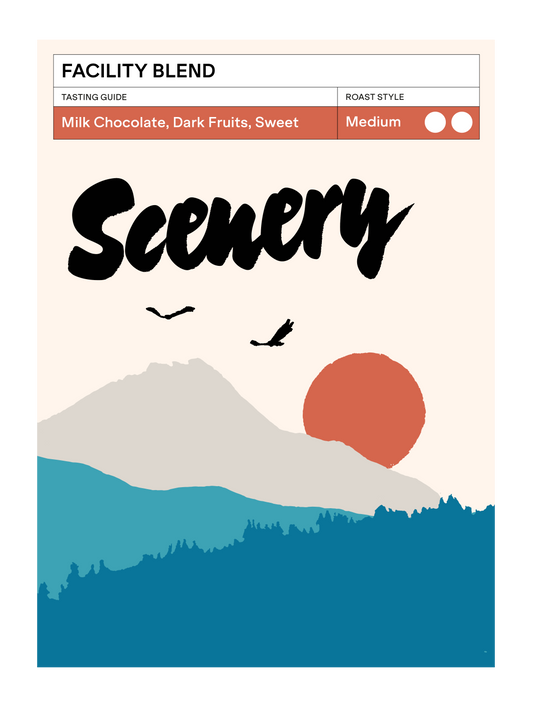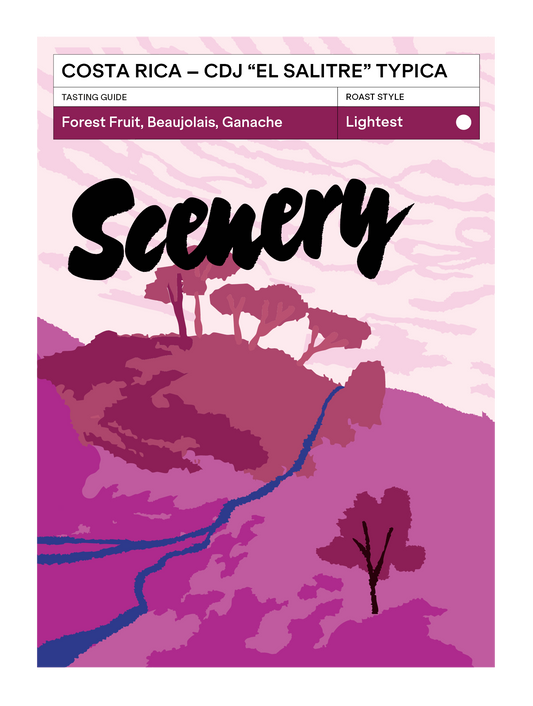This was a belter but literally lasted all of a week - running from 12/05/25 to 19/05/25. Exciting to see good Kenya return
The first Kenyan of the year - almost like firing the starting gun for the East Africa heavyweights, as we'll see our Ethiopia and Kenya selections start landing left right and centre for a jam-packed summer (pun - very much -intended). We're super excited by what this lot represents - all the samples we have seen from Kenya seem to be a roaring return to form, with some intensely classic Kenyan flavours expressing in a way that was sorely missed for the last few years.
Part of our LCF special release series, we only have an extremely limited amount of this coffee left.
Brew Guide:
Best Brewed with: Filter
Lightest Roaster Influence: Super light, fast roast with short development - we're maximising juicy acids, like fresh picked forest fruits.
Best Rested: 3-4 weeks
Filter: 60g/L & 98°C, with rest we like to move down to 94°C
Espresso: Turbo shots + 3 weeks rest. 18g/50g+ & 20s
We’re tasting:
Intensely juicy with blackcurrant & honeysuckle aromas, muscat grape, and bright citrus. As the cup unfolds there's damson plum, raspberry, brown butter unctuousness. As it cools there's whitecurrant and ripe kumquat lingering in the finish. When a touch too fresh, there can be some sweet floral tomato leaf herbaceousness, but it rests out into juicy currants.
Traceability
Country of Origin: |
Kenya |
Region: |
Karumandi, Gichugu, Kirinyaga |
Producer: |
1600 smallholder farmers in the Baragwi Farmers’ Cooperative Society |
Factory: |
Karumandi |
Variety: |
Primarily SL-28 & SL-34, with some Ruiru 11 & Batian |
Elevation: |
1600 - 1800 MASL |
Process: |
Washed: Cherries delivered to Karumandi and are hand-sorted on arrival. Cherries are pulped using an Agaarde disc pulper, which also sorts via density into 3 seperate output channels into holding tanks. |
Import Partner: |
Nordic Approach |
Harvest |
Crop 24/25, Arrived UK May 9th 2025 New purchasing relationship. |
The Story
After the challenges of recent years, Karumandi has delivered exactly what we've been missing. Established in 1961 as part of the Baragwi Cooperative Society, this washing station (named for the abundance of moles in the area) sits at 1700 masl on Mount Kenya's mineral-rich volcanic slopes. This prime location in Kirinyaga places it in the heart of Kenya's quality corridor between Nyeri and Embu, regions that have defined Kenyan speciality coffee for decades.
We talked in the previous two years about the crisis in Kenyan coffee, and how especially the 23/24 crop year was a bit of a dud. But we've been stoked by everything we've seen and committed to so far from this latest crop - a real return of classic Kenyan flavours.
What makes 2025 different? Timing. The cherry maturation conditions aligned beautifully, with ideal pre-harvest rains leading to exceptional cherry development (irregular rains have become an intense problem in coffee production the world over, a distinct symptom of the climate crisis disrupting weather patterns).
While Kenya has struggled with production challenges in recent years, this season has delivered an unprecedented 60% of the harvest at AA grade - the largest screensize, which indicates just how happy the trees were during harvest. Contrast this to Brazil's recent harvest where there was extreme issues with drought and heat, producing a majority small-screen size harvest.
The Baragwi FCS is one of the oldest registered coffee farmer's co-ops in Kenya, and it's that old-school mentality that sees the classic Kenyan processing method delivering the goods. Whilst sorting, overnight fermentation, and thorough washing has been a consistent feature in Kenyan production, many mills reduced the fermentation times and crucially the extra soak (a secondary hold in cool water that was oft thought to contribute to Kenya's quality). The predominantly SL28 and SL34 varieties planted by the smallholder farmers respond exceptionally well to this process, especially in a year where everything has come together so perfectly, and it's like a window into the Kenya of yore.
Unlike last year's scenario where logistical bottlenecks and shipping delays degraded quality, this season's early peak (stunning coffees appearing as early as December) and smoother export channels have preserved the vibrant characteristics we expect from top Kenyan lots. The first shipments were secured and moved quickly, maintaining that zippy acidity and complex fruit profile that makes Kenyan coffee so distinctive - we had this coffee ready for the London Coffee Festival in early may, and no air-freight was involved to do so.
This lot from Karumandi epitomizes what happens when everything aligns—ideal growing conditions, meticulous processing, and efficient logistics— it's a banger, and the perfect opening statement for what's shaping up to be an extraordinary Kenyan season.

![[62] Kenya - Karumandi AA #009 [CROP 24/25 ARCHIVE]](http://scenery.coffee/cdn/shop/articles/kenya_karumandi_shopify_1348d30f-d23d-42c3-b01d-af40c42834e4.png?v=1748861426&width=1100)
![Colombia - Quebraditas Ají Thermal Shock Washed [FESTIVE SPECIAL] 🎄](http://scenery.coffee/cdn/shop/files/colombia_quebraditas_aji_shopify.png?v=1764358600&width=533)






![Colombia - Quebraditas Sidra Thermal Shock Washed [25/26]](http://scenery.coffee/cdn/shop/files/colombia_quebraditas_sidra_2526_shopify.png?v=1765544630&width=533)



![Colombia - Luz Ángela's Chiroso [25/26]](http://scenery.coffee/cdn/shop/files/colombia_luz_angela_chiroso_2526_shopify.png?v=1764359755&width=533)


![Colombia - El Jaragual Rosado [25/26]](http://scenery.coffee/cdn/shop/files/el_jaragual_rosado_2526.png?v=1757075842&width=533)